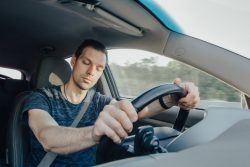Sleep Apnea and Drowsy Driving: What You Need to Know
May 26, 2021
Each year, there are roughly 6 million car accidents in the U.S. Some are minor fender benders with no significant damage or consequences, while others result in tragedy. It is the responsibility of each individual driver to be as safe as possible while operating a vehicle. Unfortunately, many people get behind the wheel when they are tired, which presents a threat both to themselves and others sharing the road with them. Let’s talk about the dangers of drowsy driving and how sleep apnea treatment may be able to help you be as safe as possible on the road. and avoid unnecessary risk.
The Consequences of Drowsy Driving
According to a conservative estimate from the National Highway Traffic Safety Administration, 100,000 accidents are caused by drowsy driving each year, resulting in more than 1,500 deaths and 71,000 injuries. People who are fatigued are three times more likely to be involved in an accident. Even more concerning is the fact that about half of Americans admit to regularly driving when they are drowsy, and 20% say they have actually fallen asleep behind the wheel while driving.
Who Is Most at Risk of Driving when Drowsy?
There are several groups who are at a higher risk of driving when they are drowsy, including shift workers, people with more than one job, young drivers, and commercial truck drivers. Additionally, individuals with undiagnosed or untreated sleep disorders are at risk and don’t even know it. In fact, it is estimated that people with untreated obstructive sleep apnea (OSA) are a whopping seven times more likely to be involved in a drowsy driving crash than people who get an adequate, restful amount of sleep each night.
How to Be Safer on the Road
If you find that you are often tired, it is possible that you are suffering from untreated sleep apnea. This condition disrupts your breathing at night, which in turn makes it impossible for you to get high-quality, rejuvenating rest. Here are some warning signs that indicate you should speak with a healthcare professional about getting tested for OSA:
- Your partner has told you that you snore loudly.
- You often wake up with a headache or sore throat.
- You sometimes wake up gasping for air.
- You have OSA risk factors. For example, obese individuals and those who smoke cigarettes are significantly more likely to suffer from OSA.
Once you receive an official OSA diagnosis, you can begin to consider your treatment options. Many individuals find that a custom-fit oral appliance from a sleep medicine expert is the most convenient way to address and overcome OSA. Oral appliances are designed to slightly reposition the jaw in order to facilitate better breathing at night.
Drowsy driving due to OSA is a dangerous problem, and fortunately, it is largely preventable. If you believe you are suffering from a sleep disorder, seeking help as soon as possible can increase both your safety and that of your fellow drivers. Sleep well and stay safe on the road!
Meet Your OSA Expert
Dr. Kenneth Mogell, a board-certified specialist in sleep medicine with over 10 years of experience treating sleep breathing disorders is the practice’s founder and primary practitioner. The practice has three South Florida locations: Boca Raton, Melbourne, and Vero Beach. To learn more about Florida Dental Sleep Disorders and Dr. Kenneth Mogell, contact our team at 844-294-7559.
